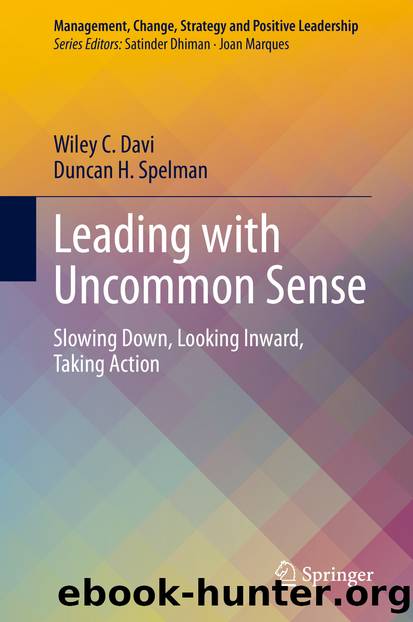Leading with Uncommon Sense by Wiley C. Davi & Duncan H. Spelman

Author:Wiley C. Davi & Duncan H. Spelman
Language: eng
Format: epub
ISBN: 9783030419714
Publisher: Springer International Publishing
Fault Lines
In one of the courses that we taught together, our students stayed in a motel for a couple nights in connection with a service-learning project. We had four or five students per room in order to save money. When we arrived at the motel, we allowed the students to sort out who would be in which room. After dropping off our own luggage, we went to the students’ rooms to make sure everyone was settled in. We found that the three women of color in the class were in a room together. They told us that the five white women had immediately chosen a room with each other, without involving them in the decision-making. The women of color seemed shocked and upset at how quickly this had come about. When we pointed out to the white women what had happened, it seemed that the racial dynamics of room choice had been totally out of their awareness. They appeared genuinely surprised that this had occurred and that it was noticed by the women of color. (That the women of color had noticed is an example of the bicultural awareness of marginalized group members that we mentioned above.)
This incident demonstrates that the dynamics related to social identities often operate unconsciously. We knew that many of the white women who made this choice were vocally committed to counteracting stereotypes and prejudice. The course in which we worked with them focused on diversity and social identities, and we had spent the semester studying how to address racism, sexism, and similar societal problems. The women seemed authentically concerned about working to minimize the negative impact of the baggage we carry related to social identities, yet when faced with a real-world moment, they appeared to be driven by other forces.
This experience also demonstrates another crucial element of how social identities affect the way we see those around us. In groups and teams, “fault lines” [26] often exist based on social identities such as age, professional specialty, gender, race, and other differences. Team members often connect more strongly with other members who share social identities. When we present the left-handed, right-handed analogy in workshops on leadership, we often hear from lefties that they quickly notice who the other lefties are when joining a new group. (This is generally not true for righties.) We must repeat, handedness is a relatively less powerful social identity.
Fault lines create the likelihood of subgrouping within the team, usually a negative influence on productivity and satisfaction, unless the subgroups are discussed and managed. Leading with uncommon sense calls on us to pay attention to potential fault lines, noticing the social identity differences that exist on teams we’re leading. In addition, we need to pay attention to how fault lines are affecting our own reactions to people with whom we share teams. To whom are we attracted based on social identity similarities, and with whom might we have more trouble connecting [27]?
Download
This site does not store any files on its server. We only index and link to content provided by other sites. Please contact the content providers to delete copyright contents if any and email us, we'll remove relevant links or contents immediately.
Tools of Titans by Timothy Ferriss(8363)
Change Your Questions, Change Your Life by Marilee Adams(7756)
Deep Work by Cal Newport(7063)
Playing to Win_ How Strategy Really Works by A.G. Lafley & Roger L. Martin(6225)
Man-made Catastrophes and Risk Information Concealment by Dmitry Chernov & Didier Sornette(6002)
Big Magic: Creative Living Beyond Fear by Elizabeth Gilbert(5753)
Digital Minimalism by Cal Newport;(5747)
Ego Is the Enemy by Ryan Holiday(5412)
The Slight Edge by Jeff Olson(5410)
The Motivation Myth by Jeff Haden(5203)
The Laws of Human Nature by Robert Greene(5170)
Stone's Rules by Roger Stone(5080)
Tuesdays with Morrie by Mitch Albom(4767)
Eat That Frog! by Brian Tracy(4522)
Rising Strong by Brene Brown(4448)
Skin in the Game by Nassim Nicholas Taleb(4235)
The Money Culture by Michael Lewis(4196)
Bullshit Jobs by David Graeber(4179)
Skin in the Game: Hidden Asymmetries in Daily Life by Nassim Nicholas Taleb(3987)
